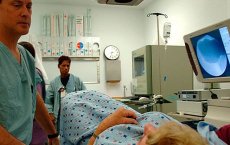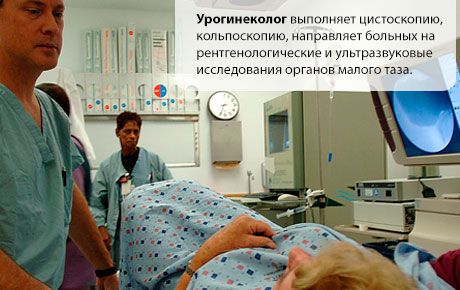New publications
Urogynecologist
Last reviewed: 03.07.2025

All iLive content is medically reviewed or fact checked to ensure as much factual accuracy as possible.
We have strict sourcing guidelines and only link to reputable media sites, academic research institutions and, whenever possible, medically peer reviewed studies. Note that the numbers in parentheses ([1], [2], etc.) are clickable links to these studies.
If you feel that any of our content is inaccurate, out-of-date, or otherwise questionable, please select it and press Ctrl + Enter.

A urogynecologist is a doctor who deals with the prevention and treatment of diseases of the female urinary system.
A urogynecologist can help women suffering from enuresis, cystitis, urethritis, and genitourinary infections.
Who is a urogynecologist?
A urogynecologist performs cystoscopy, colposcopy, and refers patients for X-ray and ultrasound examinations of the pelvic organs.

Cystoscopy in urology and gynecology determines the nature of many diseases of the female genital and excretory organs. The method is of particular value from a diagnostic point of view for identifying congenital pathologies of the urinary system, such as urethrocele. Cystoscopy helps to establish the stage of a malignant tumor process.
Urethroscopy helps to recognize and treat inflammation of the urethra.
A urogynecologist treats such a common female urological disease as cystitis. Cystitis often occurs after infections or as an allergic reaction. Signs of cystitis: pain in the lower abdomen, blood and pus in the urine.
A urogynecologist can also help a woman cope with pyelonephritis. Pyelonephritis is an inflammation of the kidneys that occurs in an acute or chronic form, developing as a result of non-treatment of acute or other diseases: tonsillitis, some gastrointestinal diseases, diabetes, flu. It can be diagnosed by chance, by urine analysis. Symptoms of pyelonephritis: fatigue, lack of appetite, unstable stool, dull pain in the lower back, high blood pressure, pale skin. Pyelonephritis is successfully treated with drugs to improve immunity and antibiotics.
When sneezing and exercising after 35 years, women often experience urinary incontinence, and they seek help from a urogynecologist. Many women do not believe that they are sick, so they do not seek help. At the same time, modern medicine successfully treats this unpleasant condition both conservatively and surgically.
When should you see a urogynecologist?
If you have urethritis, bartholinitis, chronic cystitis, chronic pyelonephritis or sexual dysfunction, consult a urogynecologist.
To cope with the symptoms of cystitis - a problem that most often forces women to see a urogynecologist, spicy, fried, salty foods must be washed down, do not drink coffee and soda, it is better to just drink still water, treat tonsillitis and caries, do not sit on the cold ground or curb, dress warmly. Avoid stool disorders and wash yourself after visiting the toilet.
What tests should be taken when visiting a urogynecologist?
The urogynecologist may ask you to take a general blood test, a urine test, and a smear for flora.
A complete blood count is the first method of examination for doctors of almost all specialties. And for good reason – despite its simplicity, it can be quite informative. For a complete blood count, blood is taken from a finger on an empty stomach. The number of red blood cells, the hemoglobin level, the number of white blood cells and the white blood cell count, the number of platelets, the rate of erythrocyte sedimentation – all this can be determined by a complete blood count. Blood is collected in a vessel using a pipette after pricking the ring finger.
The number of red blood cells shows the ability of tissues to feed on oxygen and to clear themselves of carbon dioxide. Hemoglobin is contained in red blood cells, and a decrease in its level also leads to oxygen starvation. High hemoglobin occurs with dehydration.
Platelets help blood to clot when blood vessels are damaged. Increased platelet levels occur after operations and with a congenital tendency to form blood clots. Platelet levels below the clinical norm occur with congenital blood diseases and purpura, which is an autoimmune injury to platelets.
Leukocytes are our defense against viruses, bacteria, parasites. Their high level is associated with infections, and a low level indicates a blood disease. Lymphocytes are a type of leukocyte. A high content of lymphocytes in the blood is associated with the flu virus, hepatitis, and a low level is associated with AIDS.
The erythrocyte sedimentation rate increases in inflammation and cancer.
A urogynecologist may order a urine test to detect urological pathology. The normal specific gravity is 1020-1024 and reflects the kidneys' ability to concentrate. Healthy people have clear urine. Mucus in the urine indicates inflammation of the urinary system. Normal urine is slightly acidic or neutral. Alkalinization of urine occurs with diabetes mellitus and chronic renal failure. There should be no more than 0.033 g/l of protein in the urine. An increase in the amount of protein indicates kidney inflammation. If glucose is detected, diabetes mellitus may be suspected.
What diagnostic methods does a urogynecologist use?
A urogynecologist uses diagnostic methods such as urethroscopy, colposcopy, cystoscopy, CT, and bacterial culture.
Urethroscopy is an examination of the urethra, which is performed under local anesthesia after emptying the bladder. The procedure is prescribed for chronic urethritis and urinary incontinence. During urethroscopy, the doctor evaluates the mucous membrane of the urethra. The examination lasts only a few minutes. The risk of hospital infection is minimized.
Colposcopy is an examination of the cervix using a colposcope. Colposcopy is painless because it is contactless. It should ideally be performed once every six months.
Cystoscopy is an examination to assess the condition of the bladder, and may also be prescribed by a urogynecologist to diagnose cystitis. During the procedure, the doctor inserts a flexible or rigid tube into the opening of the urethra. The procedure lasts 20-25 minutes. The urethra may be painful after cystoscopy for 2-3 days. If you had tissue taken for a biopsy, there may be some short-term bleeding from this area.
CT of the urinary tract can be performed with or without contrast. CT helps in the diagnosis of tumors, congenital anomalies, cysts and stones. CT is especially informative in case of urolithiasis, cysts and developmental anomalies.
What does a urogynecologist do?
Urogynecologist is a rare specialty in Ukraine, dealing with problems of treating the pelvic floor organs in women: urinary incontinence, prolapse of the uterus and bladder, kidney diseases, urogenital fistulas. Do not delay, visit the urogynecologist's office if you feel pain when you go to the toilet to pee, or if you have difficulty emptying the bladder, prolonged pelvic pain, a feeling of prolapse of the uterus, renal colic, malaise and pain in the lower back. Urogynecologist helps women with kidney pathology: hydronephrosis, pyelonephritis, urinary incontinence.
Advice from a urogynecologist
You may need treatment by a urogynecologist if you suffer from thirst attacks and swelling, problems with urination. If you experience pain when urinating or it is very painful, we recommend that you take a general urine test, urine culture, ultrasound of the kidneys and cystoscopy. Find out where a good urogynecologist works in your city and contact him, perhaps it is worth consulting with friends. During the consultation, you must pay attention to whether the doctor is attentive to you, a good doctor will not prescribe treatment at the first meeting, only after a full examination.
A urogynecologist is a combined specialist with a good knowledge of the physiology of the female reproductive and urinary systems, taking into account their close relationship.
